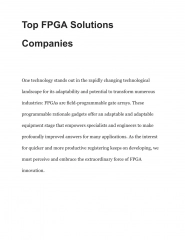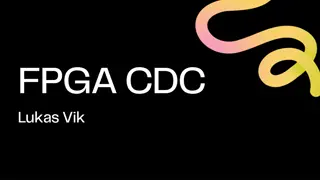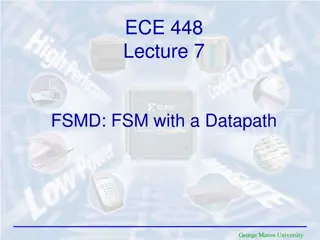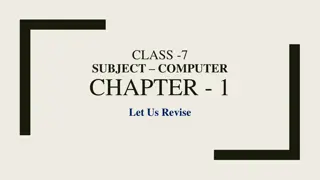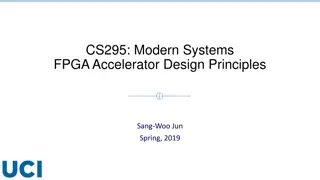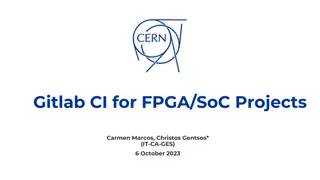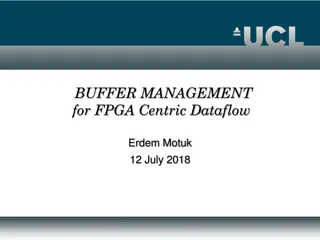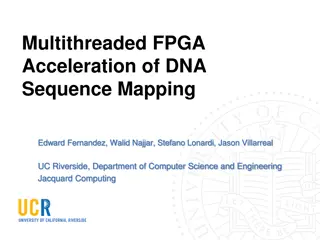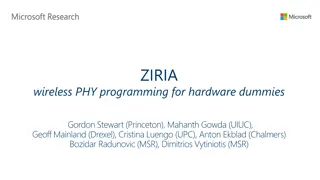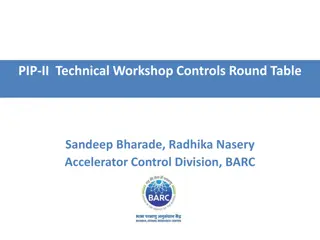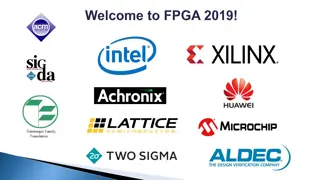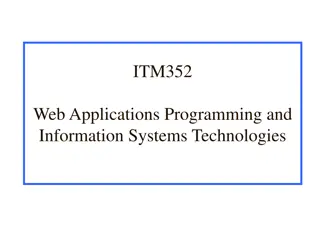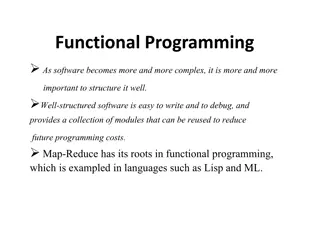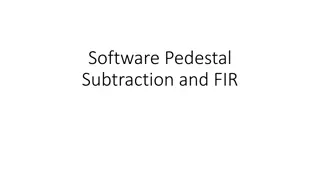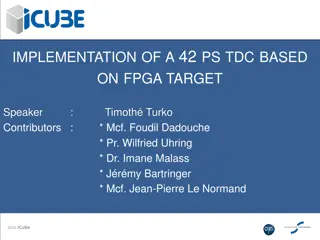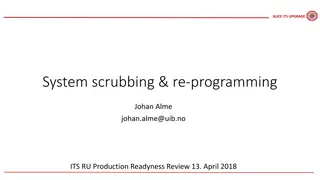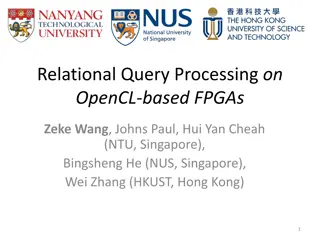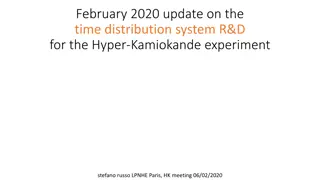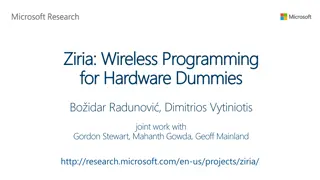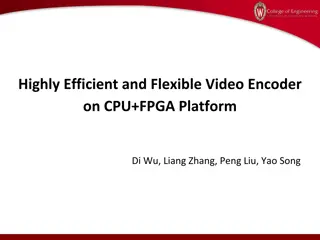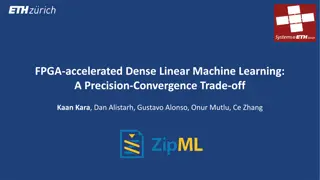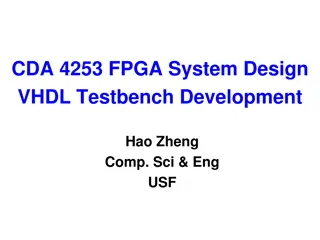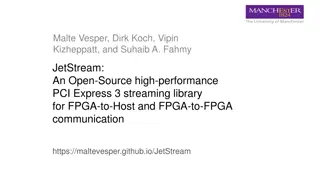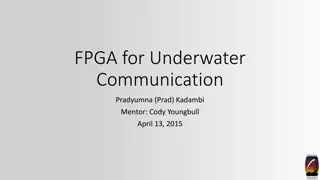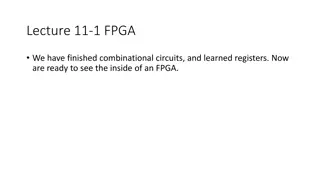Top FPGA Solutions Companies
In the rapidly evolving technological landscape, one technology stands out for its versatility and potential to revolutionize various industries: Field-Programmable Gate Arrays (FPGAs). These programmable logic devices offer a flexible and customizable hardware platform that enables engineers and de
1 views • 1 slides
Advanced FPGA Design: Ensuring Safety, Reliability, and Predictability
With a background in MSc Applied Physics and 10 years of experience in FPGA development, the focus is on verifying asynchronous and analog aspects of FPGA design for safe, reliable, and robust performance. Limited resources and articles drive the need to collaborate for knowledge sharing and explori
0 views • 18 slides
Understanding FSMD: FSM with Datapath in FPGA Design
Explore the concept of Finite State Machine with Datapath (FSMD) in FPGA design, as discussed in the lecture at George Mason University. Learn about translating sequential algorithms into hardware, using registers and control paths to simulate variables, and realizing systems through RTL design. Dis
3 views • 54 slides
Decision Analysis and Operations Research in Management
This content delves into Management Decision Analysis and Operations Research techniques such as Linear Programming, Integer Linear Programming, Dynamic Programming, Nonlinear Programming, and Network Programming. It covers the phases of an Operations Research study, mathematical modeling for decisi
0 views • 36 slides
Module 2: PSEA and Safe Programming Training of Trainers (ToT) by CRS HRD
This Module 2 focuses on PSEA and Safe Programming, covering key sessions on understanding safe programming, identifying protection and SEA risks, and mitigating risks. It emphasizes the importance of safe programming in increasing safety, dignity, and access, with staff playing a crucial role. Part
2 views • 19 slides
Understanding Computer Programming: Basics and Beyond
In this chapter, we delve into the fundamental concepts of computer programming. We explore the definition of a program, the role of programming languages, types of programming languages, and generations of programming languages. Additionally, an assignment is provided to reinforce the key learnings
0 views • 25 slides
FPGA Accelerator Design Principles and Performance Snapshot
This content explores the principles behind FPGA accelerator design, highlighting the extreme pipelining via systolic arrays that enables FPGAs to achieve high speeds despite lower clock frequencies compared to CPUs and GPUs. It delves into the application of Flynn's Taxonomy, performance snapshots
0 views • 17 slides
Enhancing FPGA/SoC Projects with Gitlab CI: A Comprehensive Overview
Exploring the significance of Continuous Integration (CI) in FPGA/SoC projects, this presentation delves into the basics of Gitlab CI, defining CI jobs, the benefits of CI practices, project objectives, and the future plans for supporting over 100 users. The focus is on creating a scalable, VM-based
0 views • 13 slides
Understanding Object-Oriented Programming (OOP) in Python
Python is a versatile programming language that supports various programming approaches. Object-Oriented Programming (OOP) is a popular method in Python where objects are created to solve programming problems. OOP in Python focuses on creating reusable code, following the principle of DRY (Don't Rep
1 views • 35 slides
FPGA Centric Dataflow Buffer Management Overview
This overview discusses buffer management for FPGA-centric dataflow systems, including the use of DDR4 RAM, solid-state storage, FIFO structures, and trigger commands for efficient data processing and storage. It also covers the handling of compressed and uncompressed data volumes, proposed hardware
0 views • 12 slides
Introduction to Computers and C++ Programming Lecture 1 - Overview and Basics
This lecture covers the fundamental concepts in computer systems and programming using C++. Topics include the main components of a computer, bytes and addresses in memory, computer systems hardware and software, understanding programs, programming languages, compilers, preparing and running C++ pro
1 views • 21 slides
Web Application Development and Programming CTE Program Overview
Viera High School offers a comprehensive CTE program in Web Application Development and Programming, taught by Mr. Dohmen. Students learn popular programming languages like Python, SQL, JavaScript, Java, C#, and C. The courses cover web programming, JavaScripting, and PHP programming, providing cert
1 views • 7 slides
Introduction to Programming with RobotC in Robotics Education
Programming in robotics involves giving specific directions to a robot using software like RobotC. This introduction covers the basics of programming, software organization, and how to get started with RobotC through creating flow charts and programming tasks. Learn about setting up RobotC, creating
0 views • 8 slides
Introduction to Programming and Computer Instructions
Programming is the process of creating instructions for computers to follow and accomplish tasks. It involves turning human language instructions into detailed binary machine language. Before learning programming, individuals may have different levels of experience, ranging from no experience to pro
0 views • 16 slides
Development of Attosecond Theory for Nobel Prize through Verilog Programming
Attosecond generation is a crucial technique for creating attosecond pulses by manipulating radiation waves. This research paper focuses on developing the Attosecond generation equation through Verilog programming and validating it using test programming techniques. The interface between equations,
0 views • 15 slides
FPGA Acceleration of DNA Sequence Mapping using Multithreaded Architectures
Introduction to the use of FPGA for hardware acceleration of multithreaded architectures targeting DNA sequence mapping, implementation of FHAST tool, FM-Index string matching algorithm, and evaluation of results.
0 views • 20 slides
Enhancing Wireless Programming Tools for Improved Development Efficiency
The article discusses the challenges faced by wireless researchers in current programming tools, highlighting issues with CPU and FPGA platforms. It explores the need for better tools to address manual optimizations, code portability, and innovation hurdles in wireless programming for modern technol
0 views • 49 slides
Innovations in Wireless PHY Programming for Hardware
Programming software radios is a key aspect of wireless communication research, with recent advancements in PHY/MAC design and the use of SDR platforms like GNURadio and SORA for experimentation. Challenges include FPGA limitations and the need for hardware synthesis platforms like ZIRIA for high-le
0 views • 41 slides
Advanced Controls and Systems Development in Accelerator Technology
Explore the cutting-edge technologies and extensive experience in system development within the Accelerator Control Division at BARC. The workshop covers a range of topics including SoC-FPGA system architecture, GUI development for RF control, EPICS application development, and lessons learned in im
0 views • 15 slides
CS252 Systems Programming Course Overview
This course overview covers topics such as C programming review, Unix basics, Unix systems programming, and grading details. The course includes labs on C/C++ programming, Unix shell scripting, and writing your own shell. Communication is emphasized through Piazza for questions/answers and Blackboar
0 views • 41 slides
Exploring the Latest Trends in FPGA Technology and Applications
The ACM International Symposium on FPGAs brought together industry leaders and academia to discuss the rapid growth of FPGA technology in fields like machine learning, circuit design, and computing architectures. With insightful sessions, keynotes, and panels, the symposium highlighted the increased
0 views • 13 slides
Introduction to Programming Languages and Functional Programming with OCaml
Welcome to Lecture 1 of CSEP505 on Programming Languages focusing on OCaml and functional programming. Professor Dan Grossman introduces the course, discusses the importance of studying programming languages, and shares insights on course mechanics and content. Topics include staff introductions, co
0 views • 84 slides
Understanding ITM352 and Its Role in MIS
Welcome to ITM352, a course focusing on acquiring basic programming skills in a business context. This course emphasizes hands-on experience in developing relevant software applications, addressing real technology problems, and fostering rapid self-learning of IS/IT technologies. Misconceptions arou
0 views • 36 slides
Understanding Functional Programming Paradigm
Functional programming emphasizes well-structured software that is easy to write and debug, with reusable modules to reduce future programming costs. It introduces higher-order functions and first-class function values, fostering declarative programming for tasks like symbolic data manipulation and
0 views • 21 slides
Pedestal Subtraction and FIR Technique Implementation in FPGA
The content discusses the implementation of the Pedestal Subtraction and Finite Impulse Response (FIR) techniques in FPGA for processing ADC counts from a single channel. It details the update rules for pedestal values during hit detection, considerations for FIR tap values, and the process of new A
0 views • 5 slides
FPGA Data Ingest Processing for NARA Electronic Records
NARA's Innovative Systems Lab at the University of Illinois is exploring FPGA technology for electronic records management. The project aims to address challenges in data storage, retrieval, and integrity for long-term archival. FPGAs offer software-configurable chips with unique capabilities for on
0 views • 76 slides
Implementation of a 42-PS TDC Based on FPGA Target
Context: Time-to-Digital Converter (TDC) architecture, methodology, and realization for high-throughput time-correlated single-photon counting in microfluidic droplets. Fluorescence Lifetime (FL) measurements offer high system sensitivity and accuracy. TDC specification for FPGA target with temporal
0 views • 21 slides
Essential Principles of Teaching Programming Languages
Foundational concepts in programming form the core of computing. This encompasses understanding programming fundamentals, teaching language aspects effectively, statistical programming for data analysis, and guiding students unfamiliar with programming environments towards grasping the logic and sim
0 views • 23 slides
Exploring Computer Programming Principles
Dive into the world of computer programming, covering high-level and machine languages, compilers, interpreters, writing programs, top-down design, and the array of programming languages available. Understand the essentials of building code to control computers, the diversity of programming language
0 views • 23 slides
Overview of ALICE ITS UPGRADE System Scrubbing and FPGA Programming
ALICE ITS UPGRADE system undergoes scrubbing for error correction using various techniques like Xilinx Soft Error Mitigation Core and External Scrubbing Network. The FPGA programming overview includes standard operations, remote updating methods, and FPGA versions timeline. Relevant topics cover dat
0 views • 19 slides
Relational Query Processing on OpenCL-based FPGAs
This study explores the efficient processing of relational queries on FPGA hardware using OpenCL, a programming language for heterogeneous computing environments. The evolution of FPGA architectures, optimization methods for OpenCL, and the benefits of kernel vectorization and compute units are disc
0 views • 38 slides
Time Distribution System R&D Update for Hyper-Kamiokande Experiment
In the February 2020 update, Stefano Russo from LPNHE Paris presented the progress on the time distribution system R&D for the Hyper-Kamiokande experiment. The focus is on implementing a bidirectional data exchange link with a large bandwidth capacity for synchronous, phase-deterministic protocol. T
0 views • 17 slides
Wireless Programming for Hardware Dummies: Simplifying Wireless Research in the Industry
Explore the world of wireless programming for hardware beginners with a comprehensive guide on software-defined radios, FPGA usage, and modern wireless research challenges. Discover the importance of innovative PHY/MAC designs, new protocols like 5G and IoT, and the need for high-rate DSP in wireles
0 views • 76 slides
CS 288-102 Intensive Programming in Linux Spring 2017 Course Details
Learn Linux programming, C language proficiency, Bash scripting, and more in this intensive course taught by Instructor C.F. Yurkoski. The course covers programming in Linux environment, command line interface, C language, client/server programming, and essential programming concepts like pointers,
0 views • 31 slides
Efficient Video Encoder on CPU+FPGA Platform
Explore the integration of CPU and FPGA for a highly efficient and flexible video encoder. Learn about the motivation, industry trends, discussions, Xilinx Zynq architecture, design process, H.264 baseline profile, and more to achieve high throughput, low power consumption, and easy upgrading.
0 views • 27 slides
Efficient Training of Dense Linear Models on FPGA with Low-Precision Data
Training dense linear models on FPGA with low-precision data offers increased hardware efficiency while maintaining statistical efficiency. This approach leverages stochastic rounding and multivariate trade-offs to optimize performance in machine learning tasks, particularly using Stochastic Gradien
0 views • 26 slides
Testbench Development in FPGA System Design Using VHDL: An Overview
Testbenches play a crucial role in FPGA system design using VHDL by allowing for systematic testing of digital circuits. They facilitate the application of stimuli to the Design Under Test (DUT) and verification of expected outputs. This overview covers the basic processes involved in testbench deve
0 views • 40 slides
Overview of JetStream: A High-Performance PCIe Streaming Library for FPGA Communication
JetStream is an open-source PCIe streaming library developed for efficient FPGA-to-Host and FPGA-to-FPGA communication. It implements key OSI layers, handles physical and data link layers, and provides mechanisms for chunk transfers and managing outstanding requests. JetStream offers superior perfor
0 views • 23 slides
FPGA for Underwater Communication Project Overview
This project, led by Pradyumna (Prad) Kadambi with mentor Cody Youngbull, aims to develop a robust high-speed underwater communication system using Field Programmable Gate Arrays (FPGA). The project addresses the slow and cumbersome nature of current underwater communication methods, with a focus on
0 views • 9 slides
Understanding the Inner Workings of FPGA and Complex Programming Logic Devices
Delve into the inner mechanisms of Field Programmable Gate Arrays (FPGA) and Complex Programming Logic Devices, examining components such as configurable logic blocks, lookup tables, function generators, multiplexers, and flip-flops. Explore the application of Shannon's Expansion Theorem in circuit
1 views • 10 slides
